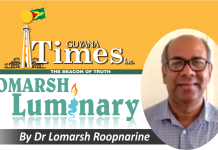Last week, I showed that globalisation was the main driving force behind the formation of an ethno-global Indian identity. In this column, I will address the characteristics so associated with ethno-global Indian identity.
Since the 1950s, there have been concerted efforts to connect India with the Indian Caribbean. Ever since Indians were brought to the Caribbean in the nineteenth century, Indian Swamis and Muslim leaders from India have travelled to and lived in the Caribbean teaching and preaching Hindu and Islamic spiritually. These sentiments for a closer connection between the Caribbean and India were expressed through individual lectures, associations and the media such as the East Indian Association and the East Indian Weekly.
In recent times, there have been attempts by the Indian government to unite or at least connect Indian people with the Indian Diaspora – Pravasi Bharatiya Divas – or people of Indian origin – for their contributions to India. January 9 was recommended as Pravasi Bharatiya Divas, the day Mahatma Gandhi returned from South Africa in 1910.
Gandhi went to South Africa to challenge the injustices of the indenture system there. A number of top Indians officials –Bharrat Jagdeo and Basdeo Panday – from Caribbean have received awards for their stewardship associated with Pravasi Bharatiya Divas.
The Indian government has also granted dual citizenship to Indians in sixteen countries with large Indian populations, which interestingly excludes some Caribbean countries, although this position might have changed in recent times. The Indian government states that citizenship will be given to overseas Indians based on compatibility of the legal system in the countries they reside as well as certain requirements associated with the definition of dual citizenship.
The idea of granting dual citizenship to overseas Indians is intended to review emotional bonds that were lost during out-migration and to re-establish cultural, economic and spiritual links with India. The Indian government believes that all Indians, wherever they reside, constitute the global Indian family and efforts are skewed in that direction to promote a universal blood brother and sisterhood, especially in former indentured colonies where there appears to be a widespread nostalgia for things Indian.
This ethno-global identity is enhanced through travel agencies that offer pilgrimage packages to Indians in the diaspora to visit India. Likewise and in a sort of a natural exchange, Indian films (Bollywood) and Indian music continue to pour into the South Caribbean, which promotes and sustains an inadvertent Indo-Caribbean revitalisation movement sweeping through the region.
This movement is supported by continuous symposia and seminars, most noticeable in Trinidad. For the past two decades, there has been at least a yearly conference at the University West Indies in Trinidad on Indian issues. The primary motive behind these yearly conferences is to engage the Caribbean and the Indian Diaspora with India vis-à-vis on issues that affect Indians such as ethnic discrimination, ethnic conflict, ethnic identity, and so on.
Whenever Indians have met as a global family, be it for academic, cultural or human rights reasons, exchanges are at the highest level and they may even garner and galvanise substantial support to challenge forces that affect or violate them. No other organisation in the Indian global community has been so vocal than the Global Organisation of People of Indian Origin (GOPIO).
Over the years, GOPIO has organised conferences and have addressed issues like human rights abuse and economic empowerment among Indians around the world. I am not sure of GOPIO’s impact on Indians but this global organisation has certainly brought awareness to issues affecting Indians.
GOPIO aside, ethno-global Indian identity has in recent times assumed unique characteristics. Indian identity in Guyana, for example, has taken syncretic forms such as Indian-American as it adapts to the changing realties mainly due to economic, political and social challenges exacerbated by local, national, regional and global trends.
I believe that ethno-global Indian identity is made up of individuals whose histories have been interrupted, if not affected, by forces beyond their control. These individuals are marginally integrated in and outside of their homeland. There is amongst them an uncanny sort of cultural confusion. Many cannot return to a normal life without realising that they have been shaped by foreign ideas, realising that their feeling have been neither here nor there, or realising that they have been so much of the same but yet so different.
Their identity is claimed either from a position of marginality or in an attempt to regain the lost centre of gravity. These Indians when asked who are you, the individual reply generally is “I am simply an Indian.” These Indians, I argue, are realistically lost souls with a wondering and wandering identity.
(send comments to: [email protected])










